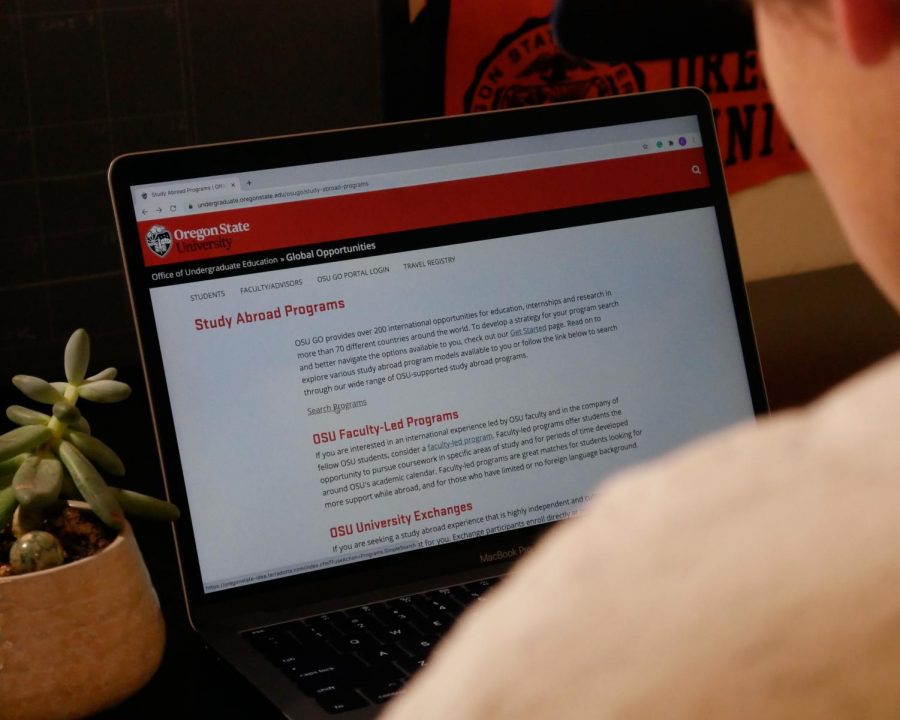COVID-19 impacts OSU study abroad programs
December 6, 2020
Due to the COVID-19 pandemic worsening throughout the past several months, study abroad programs at Oregon State University may look different going forward.
Even with uncertainty about travel availability, study abroad program planning has not come to a halt. Students can still explore the OSU Global Opportunities website to find study abroad options.
“While travel at OSU remains suspended, this is an excellent time for students to begin planning their ideal experience abroad in the future,” said Caine Francis, the director of OSU GO. “The best way to ensure a student’s study or internship program meets their personal and academic goals is to plan early and start researching the many options now.”
While programs are suspended, new issues arise in planning. Studying abroad can be expensive for students, but many programs provide scholarships and opportunities to help reduce costs.
“Rule number one: don’t buy a plane ticket until your program has been confirmed,” Francis said. “As a general rule, we in OSU GO try to give students as much notice as possible if their programs might be suspended in a particular term. Our goal is to give around 90 days’ notice as we continue to watch changing pandemic conditions around the globe.”
Students are also encouraged to register for classes on campus as a backup plan. But the odds of study abroad returning to normal in the near future are not high, even with a vaccine.
“COVID-19 vaccines very likely won’t have a significant impact on international travel overall in the near to mid-terms (one to six months),” said Samuel Gras, the health and safety coordinator for OSU GO. “[It’s] because widespread global distribution will take some time.”
It is unclear when a vaccine will be readily available in the United States alone, which poses further problems for study abroad programs. Traveling abroad will not return in the winter term and the spring term is under review.
“With so many students typically studying abroad in the summer term, we are keeping a close eye on global travel and safety conditions to determine if travel during that term will be possible,” Francis said.
In order to keep students safe abroad, OSU GO refined its risk assessment system after the early outbreak of the virus in Italy. With the OSU Travel Clinic, they monitor international, national and municipal restrictions in order to analyze risk. Some students that were abroad during the early stages of the pandemic felt it safer to stay abroad.
“We felt like, ‘well the government here is doing a good job, so why would we leave?’” said Ethan Strickler, an OSU anthropology student who stayed abroad in South Korea during the last academic year. “In South Korea, everyone was wearing masks and implementing a lot of testing and tracing; whereas, in the U.S. at the time – in March, there was almost no testing, almost no contact tracing, [and] almost no masks. It was definitely a factor in me wanting to stay.”
While Strickler was able to remain abroad, some of his friends were forced to leave. There was no hard lockdown in South Korea, which meant he could still go to cafes and restaurants, but his classes did go remote.
“At first it was a little isolating, but I was able to make the best of it,” Strickler said. “You can still meet people from all over the world, even if it’s not in face to face classrooms.”
OSU GO and many students are hopeful that the virus can be taken care of, so that study abroad programs reopen. However, despite changes to study abroad programs, there are still various online options out there that students can take advantage of.
“I think the most important thing about study abroad is just meeting people who grew up with a different perspective or worldview than you,” Strickler said. “While COVID-19 definitely makes it more difficult to meet people physically, it’s still possible when studying abroad. I think being exposed to those new perspectives and new outlooks on life is really valuable in growing and feeling more like a citizen of the world.”
























































































































